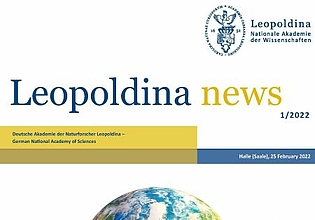News | Friday, 25 February
New issue of the Leopoldina newsletter

In the recently published newsletter issue, Leopoldina members Antje Boetius and Thomas Mettenleiter give an impression of the G7 agenda setting. Furthermore: An article by Leopoldina President Gerald Haug as a kick-off to a series of articles on policy advice in the field of conflict between science, politics and the media, as well as a preview of the Centre for Science Studie’s Spring Conference, which will deal with the research of Leopoldina member Paul Weindling on medicine under National Socialism.
The science academies of the G7 countries help to shape the agenda of the G7 summit meetings between heads of state and government – this year under the Leopoldina‘s leadership. As part of the Science7 process, they prepare statements on four topics. This year’s topics are climate action in polar regions, the restructuring of the energy system, the use of antivirals as a means of defence against future pandemics and the One Health approach. Marine researcher Antje Boetius and virologist Thomas Mettenleiter are involved in this process. In an interview, they report on the G7 agenda. More on page 4 and 5
Scientific freedom, which is enshrined in the German Constitution, enables scientists to give indepen-dent policy advice – of the kind provided by the Leopoldina as the German National Academy of Sciences – without being influenced by any political or economic interests. We still do not know what long-term effect the coronavirus pandemic will have on the relationship between science, politics and the media. Gerald Haug, President of the Leopoldina, has authored the first in a series of articles on the policy advice work in the area of conflict between science, politics and the media. More on page 9
At the Centre for Science Studies (ZfW), the British medical historian Paul Windling created a database of the victims of the medical and psychiatric research conducted during National Socialism. It includes more than 28,000 biographies, making it possible to link data on perpetrators, on prisoner functionaries and to establish connections to research literature. In an interview, he reports on how difficult it was to reconstruct the biographies and what to expect on the topic of "Medicine under National Socialism" at the Center for Science Studie's Spring Conference. More on page 11
